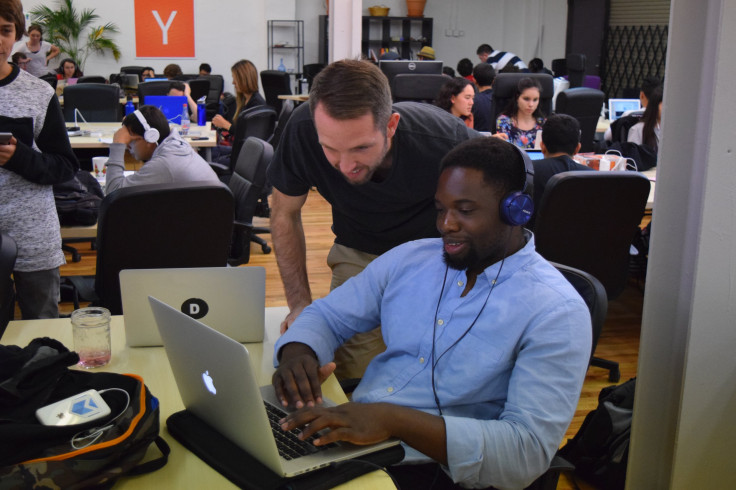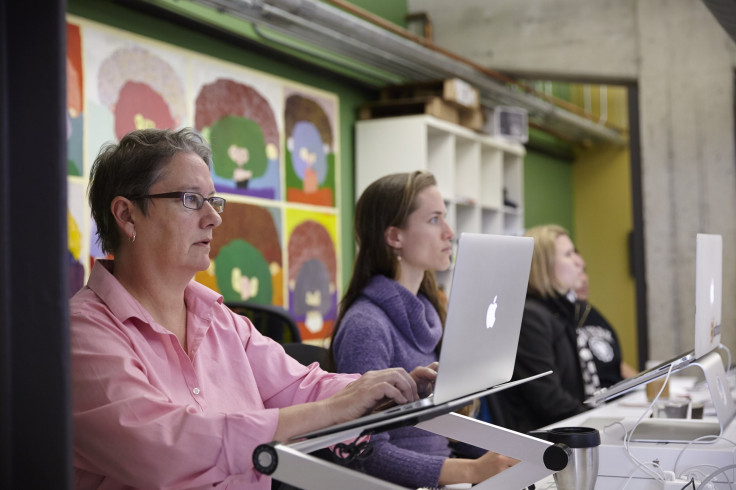Independent Tech Coding Schools Are Helping Silicon Valley With Its Race Problem

SAN FRANCISCO -- It didn’t take long for Ntambwa Basambombo to set his sights on Silicon Valley. As soon as Basambombo began studying software engineering as a freshman at Polytechnique Montreal in 2011, the Congo native began dreaming of one day coding alongside the best of the best in the tech industry.
But last fall Basambombo realized that Polytechnique Montreal isn’t one of the universities that the Apples, Facebooks and other tech giants of the world prioritize in their recruiting. That’s why in the spring he decided to apply for Make School, a 3-year-old tech school based in San Francisco that specializes in helping coders improve their skills and demonstrate their work to the numerous tech companies in the Valley.
Basambombo’s plan worked: He’s halfway through his summer program, he's building an iPhone app and he’s already landed an interview with Google.
“This is where everything is going on right now in the tech industry,” 24-year-old Basambombo said. “I’ve been able to challenge myself to see if I can deal with the best in the world.”
Many Silicon Valley companies struggle with finding tech-talented women and minorities because they limit their recruiting to the likes of Stanford University, Carnegie Mellon and the Ivy League. Those schools are predominantly white and Asian, and as such, the majority of the workers they send to Silicon Valley are much the same.
At Google, for example, just 18 percent of the tech workers are women, only 2 percent are Hispanic, and 1 percent are African-American. The situation is similar at Facebook, where only 16 percent of tech workers are women, 3 percent are Hispanic, and, again, just 1 percent are African-American. Apple has one of the best diversity situations in Silicon Valley, and yet its numbers really aren't great either, with just 20 percent of its tech workers being women while 7 percent are Hispanic and 6 percent are African-American.
But over the last few years, numerous venture capital-backed, tech-focused schools have emerged that offer the opportunity to provide Silicon Valley with a more diverse pool of candidates much like Basambombo. Many of these schools focus specifically on training women or minorities, have tuition plans that are more welcoming to low-income students than traditional universities, or offer scholarships that allow numerous women and minorities to attend. These schools are often led by techies who’ve previously worked in tech and have established relationships with the companies in the region, giving their students a more realistic shot at a Silicon Valley job than, say, Polytechnique Montreal can.
“We’re drawing all these top students from places you would expect and places you wouldn’t and bringing them all to Silicon Valley’s doorstep,” said Jeremy Rossmann, co-founder of Make School. “When any of these companies want to meet these kids, they can just walk down the street.”
Make School, for example, offers students scholarships based on their family’s financial situations for its $6,000 summer program. For its two-year program, meanwhile, Make School doesn’t charge its students until they start their summer internship and then again after they finish the program and get a job as a software engineer. Students pay their full internship salary and 25 percent of their first two years of salary once they're hired, but by delaying payment, Make School is able to attract students who would otherwise avoid higher education.
The result: Make School's current summer program has 19 percent minority representation and 26 percent female representation, both of which are much higher than what you find in many tech companies' tech workforces. The payment structure it uses has also been adopted by other coding schools, including App Academy and Viking Code School.

Many other coding schools make their programs available to women and minority students by offering scholarships through the help of partners like Women Who Code or #YesWeCode, which helps train minority youth who want jobs in tech. “We're just trying to partner with as many people as possible to figure out how we can give people free or discounted education,” said Mark Saldana, marketing manager at Galvanize, a tech school.
Galvanize's tuitions start at $16,000 for its three-month data science program, but it works with Glassbreakers.co, Jessie Jackson and the Rainbow Push Coalition and Silicon Valley Bank to offer full or partial scholarships to women and minorities.
Many of these schools who partner with Women Who Code have classes that are at or close to 50 percent women, said Alaina Percival, CEO of Women Who Code. “If these code schools are bringing in the minorities and women or people from low-income backgrounds and giving them an opportunity, together we’re going to change the face of the tech industry,” Percival said.
Another innovative coding education company is Piazza, whose platform is used by computer science students at colleges all across the United States. Piazza is available free to its more than 1 million registered students, who can use the service for help answering the toughest coding questions. Piazza makes money by charging tech companies a fee so they can use the service to search for students based on factors like who knows C++ or which students have been top students in advanced algorithms classes. The companies can then connect with those students by sending them a message.
Piazza has the ability to introduce tech companies to skilled students regardless of where they go to school, but unfortunately, even on Piazza many tech companies limit their search to the schools where they typically recruit.
'Leaving Talent On The Table'
“They’re leaving an enormous amount of very talented, diverse students on the table,” said Jessica Gilmartin, Piazza's chief business officer. “There’s an incredible number of diverse engineers who are very talented that no one even looks at. To me, that’s just a shame.”
For women and minority students, these coding schools offer a stage where they can showcase their skills and prove they are just as qualified as anyone else. For example, at CodePath, a coding school that specializes in training and onboarding programmers already working at nearly all the major tech companies, many of the best students turn out to be women and minorities.
“This isn’t sometimes -- this is almost every time, the best student in the class ends up being a female or from underrepresented groups,” said Michael Ellison, CodePath's chief operating officer.
These programs may be different than your typical university, but tech companies are taking notice. LinkedIn and Lyft are Make School partners, for example, and attend the program’s demo days where students show off their projects. Galvanize has seen its alumni hired by companies ranging from IBM and Tesla to Twitter and PayPal. Radius, a startup that makes predictive marketing software, has hired five of its 33 engineers from Galvanize and made an offer to another student just this week. "They're new people basically coming into the workforce and this area, but at a level where they're able to contribute straight off the bat," said Jody Edmondson, Radius' data science director.
Yelp, meanwhile, has partnered with Hackbright Academy, a coding school that focuses on women, and it has recruited using HackerRank, a service that educates developers for free and lets them compete in challenges set up by companies to prove their worth and possibly land a job. HackerRank has also been used by Twitter, Amazon, Dropbox and VMware, which has hired more than 200 programmers through the service. "VMware uses tools like HackerRank extensively to select candidates based solely on their ability to code, free from any bias like gender, race, national origin or socio-economic status," the company said.
“We want to make the world flat, where the only thing that matters is your skill and not which school you go to or what company you worked at before,” said Vivek Ravisankar, HackerRank’s co-founder and CEO. “The fact that we bring meritocracy to the whole recruiting process is a huge thing.”
© Copyright IBTimes 2025. All rights reserved.






















